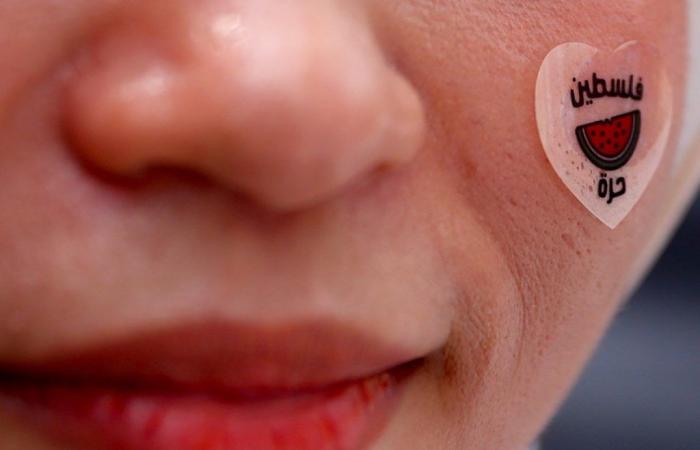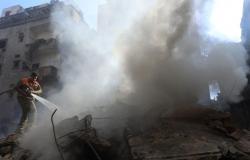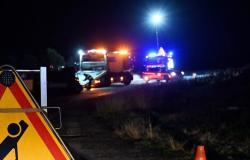Keystone-SDA
This content was published on
October 12, 2024 – 8:01 p.m.
(Keystone-ATS) The United Nations Interim Force in Lebanon (UNIFIL) warned on Saturday of a “catastrophic” regional conflict, as the Israeli army fights on two fronts: Lebanese Hezbollah and Palestinian Hamas, allies of Iran.
The United Nations Interim Force in Lebanon (UNIFIL) warned on Saturday of a “catastrophic” regional conflict, as the Israeli army fights on two fronts, Lebanese Hezbollah and Palestinian Hamas, allies of Iran.
Nine people died in new Israeli raids in Lebanon on Saturday, according to the Lebanese Ministry of Health. Hezbollah, for its part, announced that it had fired missiles at a military base near Haifa, the day after drone strikes on this large city in northern Israel.
These hostilities take place while from Friday evening to Saturday evening, Israel celebrates Yom Kippur, the day of “great atonement” during which borders, airports and most businesses are closed and public transport does not operate.
The war in Gaza, triggered by an unprecedented attack by Hamas on October 7, 2023 on Israeli soil, and that in Lebanon are accompanied by an escalation between Israel and Iran, with Israeli leaders threatening to retaliate to an Iranian attack missiles on October 1.
After weakening Hamas in Gaza, Israel moved the war front to Lebanon in September, with the aim of moving Hezbollah away from the border areas and stopping its rocket fire to allow the return to the north of Israel of some 60,000 displaced inhabitants.
“Unacceptable”
The front opened in October 2023 by Hezbollah against Israel, in support of Hamas, transformed into open war on September 23 with the start of intense Israeli bombings on Hezbollah strongholds in Lebanon, killing in particular the leader of the movement Hassan Nasrallah.
The Israeli army then launched a ground offensive on September 30 in southern Lebanon.
“The conflict between Hezbollah and Israel is not just a conflict that involves two countries. Very soon it could be a regional conflict with a catastrophic impact for all,” UNIFIL spokesperson Andrea Tenenti told AFP on Saturday.
Israel came under fire on Friday after UNIFIL stationed in southern Lebanon accused Israeli troops of “repeated” and “deliberate” firing on its positions.
Five peacekeepers were injured in 48 hours, according to UNIFIL, whose positions had suffered “a lot of damage”, said Mr. Tenenti.
US President Joe Biden asked Israel to no longer fire on UN forces in Lebanon, while his French counterpart Emmanuel Macron deemed it “unacceptable” that they were being targeted “deliberately by Israeli forces”.
The Israeli army said it fired in the direction of a “threat”.
Since October 2023, more than 2,100 people have been killed in Lebanon, including more than 1,200 since September 23, according to an AFP count based on official figures. The UN has recorded nearly 700,000 displaced people.
The Lebanese Health Ministry said nine people were killed Saturday in Israeli raids targeting the villages of Maaysra and Barja, north and south of Beirut, outside Hezbollah strongholds.
The Israeli army had previously ordered residents of southern Lebanon not to return to their homes.
“For your own protection, do not return home until further notice. (…) Anyone heading south risks putting their life in danger,” army spokesperson Avichay Adraee wrote in a message in Arabic on X.
“Children are dying”
After the intensification on September 23 of Israeli strikes on southern Lebanon, a Hezbollah stronghold bordering northern Israel, tens of thousands of families fled this region, according to the UN.
On Saturday, the Speaker of the Iranian Parliament, Mohammad-Bagher Ghalibaf, visiting Beirut, denounced the “crimes” of the “savage Zionist regime” in Lebanon.
The day before, Iran repeated that it was “ready to defend its sovereignty”, while Israel promised its sworn enemy a “surprising” response to its October 1 attack.
In the devastated and besieged Gaza Strip, the Israeli army continued its offensive, mainly shelling the region of Jabalia (north), where it accuses Hamas of seeking to reconstitute its forces.
According to local Civil Defense, 30 Palestinians were killed Friday in strikes on Jabalia.
Several bodies were taken to Gaza’s Al-Ahli hospital, according to AFP footage which showed a relative hugging the lifeless body of a child.
Not far away, a man is crying. “Children die, this girl is only two months old. What did she do to deserve this? »
Israel called on residents of an area near Jabalia to evacuate.
“They tell us to go south, but we don’t want to go there (…) some tried to go there, but they were shot at,” Sami Asliya, a 27-year-old man, told AFP who is in Gaza City after leaving Jabalia.
“While we were walking, there were injured people (on the road). My son had to carry an injured woman on his back,” says Oum Youssef Hossaniya, 70, who also comes from Jabalia.






